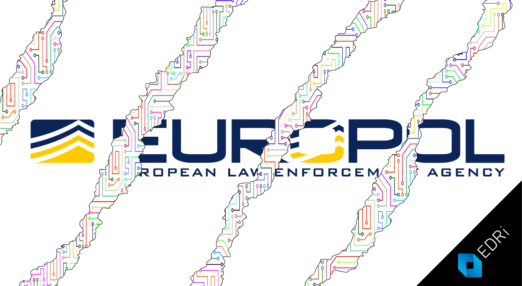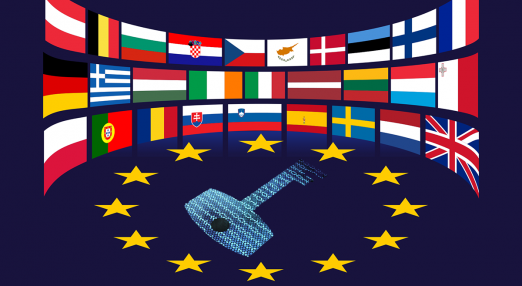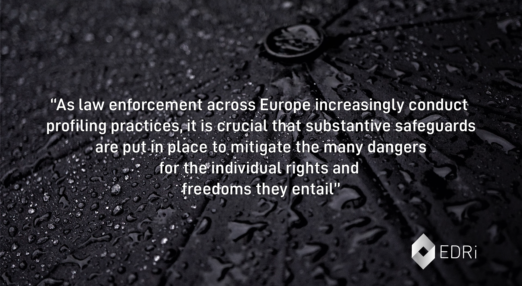law enforcement
Filter by...
-

The EU’s own ‘Snowden Scandal’: Europol’s Data Mining
On 3 January 2022, the European Data Protection Supervisor (EDPS), which supervises the processing of personal data by the EU’s law enforcement agency, Europol, ordered Europol to delete data held in its databases on individuals with no established link to criminal activity.
Read more
-

Booklet: Demonstrating gaps in the e-Evidence Regulation
The Regulation on cross border access to data by law enforcement (so-called “e-Evidence” Regulation) threatens to put the rights of journalists, lawyers, doctors, social workers and individuals in general at great risk. EDRi and 13 civil rights organisations have just launched four scenarios that clearly depict how our future could enfold if the Regulation is approved.
Read more
-

Europol inches closer to increasing its powers despite lacking accountability
Europol was caught breaking the law and developing new initiatives without any proper legal basis (e.g. Europol’s innovation lab). Many proposed changes to Europol's mandate show an attempt to legalise the agency’s unlawful activities. In addition, this revision is happening even before the first implementation evaluation of Europol’s Regulation, planned for 2022, has been carried out. Without this evaluation, it is impossible to assess whether the current rules impede the fulfilment of the Agency’s missions and whether its working practices respect fundamental rights.
Read more
-

New Cybercrime Protocol: weak safeguards against big risks of abuse
In 2017, the Council of Europe (CoE) and its Cybercrime Committee started preparing an additional protocol to the Budapest Convention on Cybercrime – a new tool for law enforcement authorities (LEAs) to have access to data held by private companies in the context of criminal investigations.
Read more
-

New Cybercrime Protocol: More overreach, still no data protection safeguards
In the context of the fifth round of consultation with civil society, data protection authorities and industry, EDRi and the Electronic Frontier Foundation (EFF) coordinated a civil society submission to provide feedback on the new draft provisions relating to joint investigations, request for domain name registration information and expedited disclosure of stored computer data in an emergency.
Read more
-

Germany asks what should the EU do about encryption for law enforcement?
On 22 September, Statewatch released a document issued by the German Presidency of the Council to help establish a common EU position on finding ways around encrypted communications for the needs of law enforcement.
Read more
-

Europol: Non-accountable cooperation with IT companies could go further
There is an ongoing mantra among law enforcement authorities in Europe according to which private companies are indispensable partners in the fight against “cyber-enabled” crimes as they are often in possession of personal data relevant for law enforcement operations. For that reason, police authorities increasingly attempt to lay hands on data held by companies – sometimes in disregard to the safeguards imposed by long-standing judicial cooperation mechanisms.
Read more
-

COVID-Tech: COVID-19 opens the way for the use of police drones in Greece
In EDRi’s series on COVID-19, COVIDTech, we explore the critical principles for protecting fundamental rights while curtailing the spread of the virus, as outlined in the EDRi network’s statement on the pandemic.
Read more
-

Facial recognition: Homo Digitalis calls on Greek DPA to speak up
In the spring of 2019, the Hellenic Police signed a €4 million contract with Intracom Telecom, a global telecommunication systems and solutions vendor, for a smart policing project. Seventy five percent of the project is funded by the Internal Security Fund (ISF) 2014-2020 of the European Commission.
Read more
-

Facial Recognition & Biometric Mass Surveillance: Document Pool
Despite evidence that public facial recognition and other forms of biometric mass surveillance infringe on a wide range EU fundamental rights, European authorities and companies are deploying these systems at a rapid rate. This has happened without proper consideration for how such practices invade people's privacy on an enormous scale; amplify existing inequalities; and undermine democracy, freedom and justice.
Read more
-

Stuck under a cloud of suspicion: Profiling in the EU
As facial recognition technologies are gradually rolled out in police departments across Europe, anti-racism groups blow the whistle on the discriminatory over-policing of racialised communities linked to the increasing use of new technologies by law enforcement agents.
Read more
-

Swedish law enforcement given the permission to hack
On 18 February 2020, the Swedish parliament passed a law that enables Swedish law enforcement to hack into devices such as mobile phones and computers that the police thinks a suspect might use. As with the recent new data retention law only one party (and one member of another party) voted against the resolution (286-26 […]
Read more
